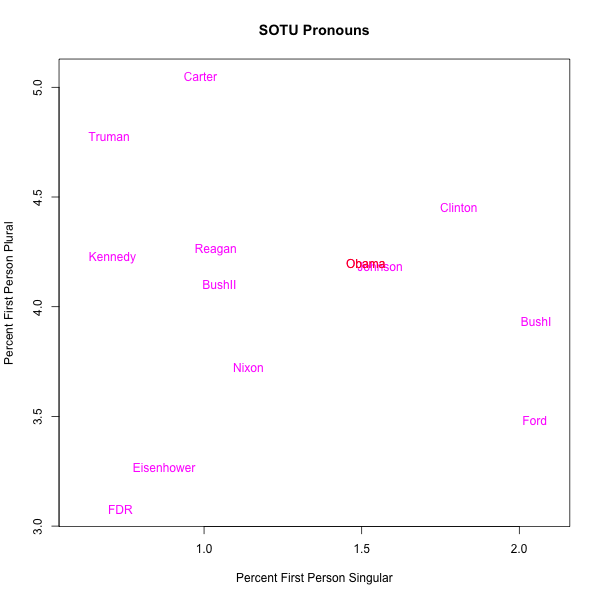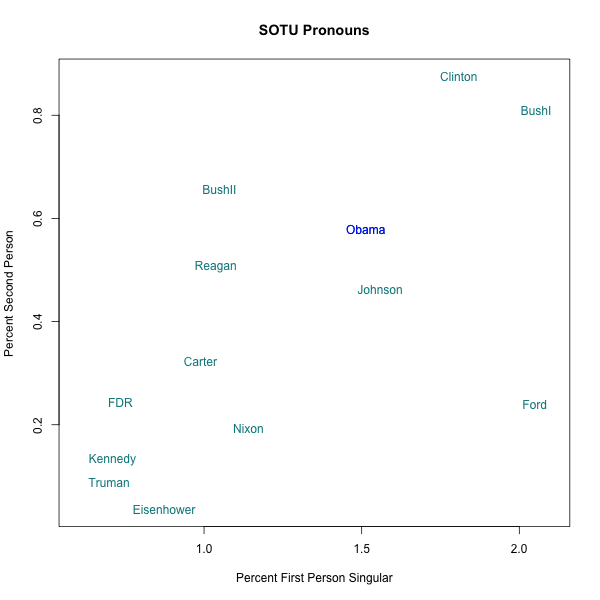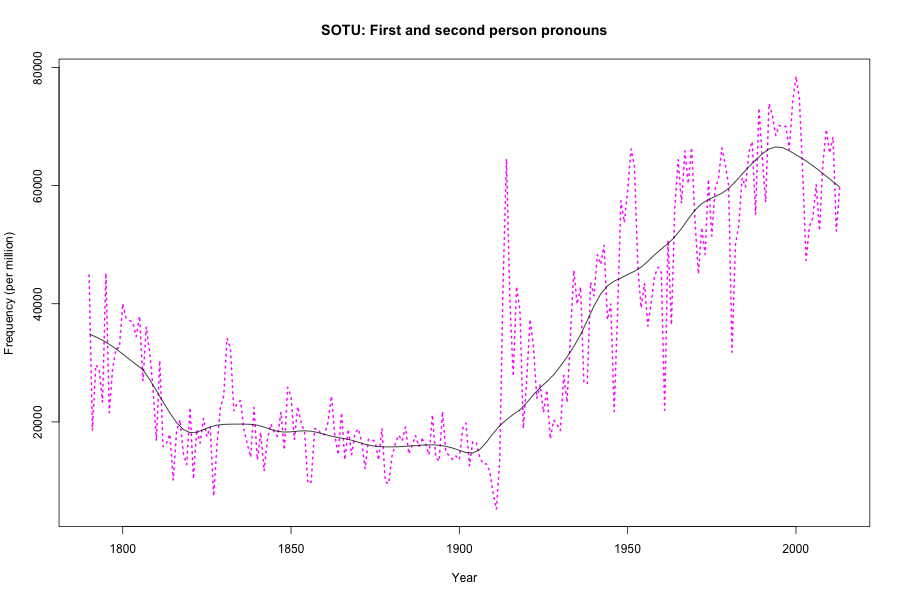The evolution of SOTU pronouns
« previous post | next post »
Following up on Sunday's "SOTU evolution" post, here's a quick glance at changes over time in the relative frequency of some classes of pronouns in State of the Union messages. Over the course of the 20th century, there's been a clear upward trend in the frequency of first and second person pronouns:
(I've plotted the yearly rates as a magenta dotted line, and used a black solid line to show the results of a lowess() fit with f=0.15)
It's tempting to explain this graph in terms of the increasingly personalization of presidential politics, or something of the sort, but in fact there's a simpler and more concrete explanation for most of the effect. The reason for the abrupt rise in 1913, and for some of the subsequent variation, was a change in the basic communicative context. As Gerhard Peters explains,
Federalists Washington and Adams had personally addressed the Congress, but Jefferson was concerned that the practice of appearing before the representatives of the people was too similar to the British monarch's practice of addressing each new Parliament with a list of policy mandates, rather than "recommendations."
Jefferson's practice changed in 1913 with Woodrow Wilson. Wilson believed the presidency was more than a impersonal institution and active and visible presidential leadership was needed to the people and the Congress. As an expression of this philosophy, Wilson delivered oral messages to Congress, citing the authority of the Constitution.
For health reasons, Wilson did not address Congress in 1919 and 1920. Warren Harding's two messages (1921 and 1922) and Calvin Coolidge's first (1923) were also oral messages. Subsequently, Coolidge's remaining State of the Unions (1924-28) and all four of Hoover's (1929-32) were written.
Franklin D. Roosevelt consolidated the modern practice of delivering an oral State of the Union beginning with his first in 1934. Exceptions include Truman's 1st (1946) and last (1953), Eisenhower's last (1961), Carter's last (1981), and Nixon's 4th (1973 and 1974 when he submitted multiple documents entitled "State of the Union.").
A regression analysis would show us that there's still a modest temporal trend, beyond the simple difference between the style of written reports and the style of speeches. Presumably this does reflect an evolution in rhetorical style — or at least in the style of rhetoric considered appropriate to these formal occasions.
Whatever its causes, the change has been much greater in the case of first person plural pronouns than either first person singular or second person pronouns:
And if we amalgamate the SOTU addresses by president from FDR forwards, omitting the written messages and including only the ones delivered orally to Congress, we can see that Barack Obama's speechwriters have put him more or less in the middle of the pronominal pack:
 |
 |
This is unlikely to prevent cries of "narcissism!" or "royalty!" from the likes of George Will, Peggy Noonan, Charles Krauthammer, and Stanley Fish. But I present this bit of prophylaxis in the hope that ridicule may eventually succeed where reality has failed.



GeorgeW said,
January 28, 2014 @ 9:14 am
It would seem that the increase in first-person plural would be a case for decreasing narcissism as the president would be sharing his accomplishments (and failures, although I suspect the references to success exceed references to failure).
A number of FPPPs might also refer to actions that are needed to be taken and would include actions by congress. However, I wouldn't think that this would change much over time unless there has been an increase in agenda setting in SOTUs.
Lane said,
January 29, 2014 @ 2:50 am
It would be great if someone had time to find some truly Obama signature phrases, doing the math properly. I'd be curious to know what words he actually does use unusually often.
Yesterday, a New Hampshire public-radio show tweeted wondering how many times Obama would say "make no mistake" last night, and wondering when he would shed this "verbal tic". 2 minutes of poking around revealed he'd used the phrase once in 5 years of SOTUs (and he didn't use it last night). I tweeted the finding back at them, and there came a bit of mild, self-mocking "oops" in reply.
So, like the president proposing the same thing in every SOTU, keep at it, Mark; eventually, the habit of actually checking these publicly available facts will seep through into the wider world. It takes time to change a culture. But it's not impossible.
Alon Lischinsky said,
February 21, 2014 @ 10:53 am
@Lane:
the math is actually rather straightforward; it's just a matter of observed vs expected frequencies, and we know how to analyse those. The really difficult bit is to determine the appropriate reference corpus; what is characteristic of Obama's language in comparison to, say, that of contemporary Democratic senators, is not going to be the same that characterises it in comparison to previous GOP presidents.